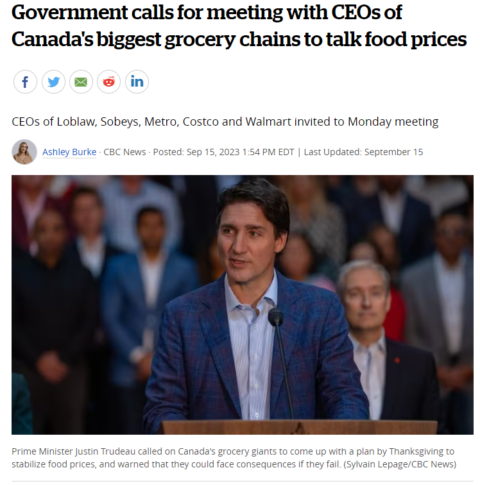Jesse Kline has some advice for Prime Minister Jagmeet Singh Justin Trudeau on things his government could easily do to lower retail prices Canadians face on their trips to the grocery store:

CBC report on federal scapegoating of grocery chain CEOs.
https://www.cbc.ca/news/politics/government-grocery-store-meeting-ottawa-food-prices-1.6967978
What exactly the grocery executives are supposed to do to bring down prices that are largely out of their control is anyone’s guess. Do they decrease their profit margins even further, thereby driving independent retailers out of business and shedding jobs by increasing their reliance on automation? Do they stop selling high-priced name-brand products, thus decreasing their average prices while driving up profits through the sale of house-brand products?
If the government were serious about working with grocers, rather than casting them as villains in a piece of performative policy theatre, here are a number of policies the supermarket CEOs should propose that would have a meaningful effect on food prices throughout the country.
End supply management
Why do Canadians pay an average of $2.81 for a litre of milk — among the highest in the world — when our neighbours to the south can fill their cereal bowls for half the cost? Because a government-mandated cartel controls the production of dairy products in this country, while the state limits foreign competition through exorbitantly high tariffs on imports.The same, of course, is true of our egg and poultry industries. Altogether, it’s estimated that supply managements adds between $426 and $697 a year to the average Canadian household’s grocery bill. It’s not a direct cause of inflation, but it’s a policy that, if done away with, could save Canadians up to $700 a year in fairly short order.
Yet not only have politicians been unwilling to address it, they have been fighting some of our closest trading partners to ensure that foreign food products don’t enter the Canadian market and drive down prices. Ditching supply management would be a no-brainer, if anyone in Ottawa was willing to use their brain.
Reduce regulations
The best way to decrease prices in any market is to foster competition. As the Competition Bureau noted in a report released in June, “Canada’s grocery industry is concentrated” and “tough to break into”. Worse still, “In recent years, industry concentration has increased”.So why don’t more foreign discount grocery chains set up shop here? Perhaps it’s because they know our national policy encourages Canadian-owned oligopolies. While grocery retailers don’t face the same foreign-ownership restrictions as airlines or telecoms, the products they sell are heavily regulated, which acts as a barrier to bringing in cheaper goods from other countries.
Although it wasn’t the primary reason for the lack of foreign competition, the Competition Bureau did note that, “Laws requiring bilingual labels on packaged foods can be a difficult additional cost for international grocers to take on”.
Other ways the federal government could help Canadians afford their grocery bills include:
- Jail thieves
- Stop port strikes
- Don’t tax beer
- Axe the carbon tax
Don’t hold your breath for any of these ideas to be taken up by Trudeau’s Liberals.



